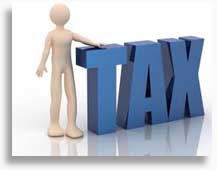TAXATION
Introduction and Name of the Job
Taxation is mainly the process of imposing financial charge (tax) on the citizens who earn 'taxable' income. State Government, Central Government, or any authority of a state, such as the Municipality or the Local Council levies the tax on the tax payers. Tax collection serves as an important role of the government, as intern tax paid by the citizens forms the government's integral source of income. Commerce graduates and post graduates are generally hired for jobs in the field of taxation. Many institutes in India are conducting courses in the field, to produce competent professionals who can work in the field of taxation.

India has today the most developed taxation structure. The tax system in India is mainly divided into the three tier system which is based between the Central, State Governments and an authority of a state, such as the Municipality, Corporation or the Local Council. The main taxes/duties of the Central Government is empowered to levy are: Income Tax (except tax on agricultural income, which the State Governments can levy), Customs duties, Central Excise and Sales Tax and Service Tax. The principal taxes levied by the State Governments are usually the Value Added Tax (VAT or Sales tax in States where VAT is not yet in force), Sales Tax (tax on intra-State sale of goods), Stamp Duty (duty on transfer of property), State Excise (duty on manufacture of certain goods), Land Revenue (levy on land used for agricultural/non-agricultural purposes), Duty on Entertainment and Tax on Professions & Callings. The Local Bodies are been empowered to levy tax on properties (buildings, houses), Octopi (tax on entry of goods for use/consumption within areas of the Local Bodies), Tax on Markets and Tax/User Charges for utilities like water supply, drainage, etc.
Course Details
Many colleges and universities in India today are conducting courses in the field of taxation, at diploma and certificate levels. To pursue the undergraduate level courses, the aspiring students must have passed Higher Secondary Certificate Examination or 10+2 from any recognized state/national Board. To be eligible for the PG courses, one has to complete graduation in the relevant stream.
Career Prospects
Public sector undertakings are always in demand of efficient professionals who can deliver good performance in the field of taxation. The aspirants have the opportunity to join any related organization as Tax Accountant, Employment Tax Specialists, State Local Tax Attorney specialists, Tax Policy Analyst, Tax Recruiter, tax advisor, Tax Manager, Tax Examiners, Collectors, Revenue Agents, etc.
Institutes
Many educational institutes in India are offering education in the field of taxation. Some of the prominent institutions are the Annamalai University, Nagpur College of Taxation, Institute of Chartered Accountants of India and Indian Institute of Taxation. Apart from this, commerce colleges have included taxation as an important part of their curriculum.
Placements and Prospects

Working for the Income Tax Department implies that one is working with tax-collection process that funds the country’s most vital programmes, which forms its security, social services, to maintaining its forests, the environment, public facilities/ infrastructure, education and so much more. The Income Tax Department administers various taxes namely the Direct Tax Acts, namely, the Wealth Tax Act 1957, Income Tax Act 1961, Interest Tax Act 1974, the Gift Tax Act 1958, Securities Transaction Tax Act 2004, Banking Cash Transaction Tax Act 2005 and Fringe Benefit Tax Act 2004, etc. There is a tremendous amount of responsibility on this kind of profile and an IT officer deals with all kinds of individuals and businesses.
Entry Routers
Taxation |
Remuneration
Remuneration in the field of taxation usually varies from one organization to the other. However, beginners can earn a salary of Rs 200000-Rs500000 per annum.
